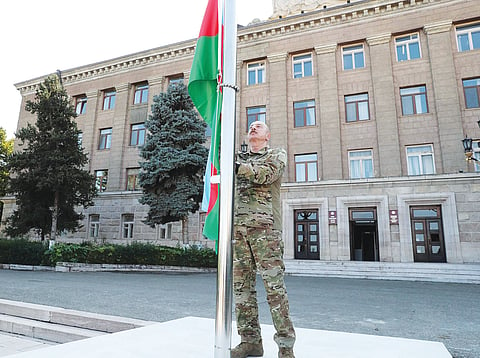

With news of a final peace agreement to end the decades long war between Armenia and Azerbaijan on the verge of being signed, Azerbaijan continues to raise the issue that has long been a source of trouble between the two republics since the before formation of the Soviet Union: The 'Syunik' Province of Armenia, dubbed by Azerbaijan as being part of the 'Zangezur Corridor', and the desire of Baku to control it, in order to connect Azerbaijan's mainland to the exclave of Nakhchivan, and by extension, Turkey.
Nikol Pashinyan, the Prime Minister of Armenia, has sought to break Yerevan away from Armenia's historical ties to Russia. On Thursday, he ordered all state agencies to 'rebuild relations with Moscow' and for Armenia to participate in joint events, likely referring to the Russian-led Collective Treaty Security Organization (CSTO), which Pashinyan has pulled Armenia out of in all but name during the last few years.
This sudden change in position, for a man who has long advocated moving Armenia to a more Western oriented course, and who has carried this out very effectively since, might be a sign that Armenia realizes that the situation is serious enough to know they can't rely on a Donald Trump led U.S. to come to their aid, and that they need to reconcile with the one country that may be able to help them.
A Short History Lesson
The borders of Armenia and Azerbaijan were drawn by Bolshevik Russia in 1922 as the Soviet Union was forming. This left a part of Azerbaijan, the Nakhchivan Autonomous Republic, separated from Azerbaijan proper by Armenia's Syunik Province.
As the Soviet Union fell apart and war broke out between the Armenians in Nagorno-Karabakh and Azerbaijan, the Armenians found themselves victorious in 1994, not only occupying all of the former Nagorno-Karabakh Autonomous Oblast, but also the territory around it which connected the now declared Republic of Artsakh with Armenia, and separating Azerbaijan proper from Nakhchivan by about 80 miles (125km). Between 1994 up until the mid-2000's, the issue of granting Azerbaijan passage rights through southern Armenia in return for concessions on Nagorno-Karabakh from Baku were discussed, and were long thought to be a way to settle the conflict.
Ultimately, Azerbaijan would end up winning the decades-long conflict, gaining full control of the region after two decisive wars fought in 2020 and 2023, which led them to occupying parts of Armenia itself since 2021, while even getting outright territorial concessions at the northern border from Armenia last May. All the while, Armenia, in a much weakened negotiating state, is trying to resist the final goal of Baku: Capturing Armenia's Syunik Province in order to establish the Zangezur Corridor.
As Azerbaijan managed to recapture all of Nagorno-Karabakh and the Armenian occupied territories around it militarily, using force or coercion to do the same with Syunik may seem like a realistic goal to them at this time, as they are in a position of great strength over their historical enemy.
Why does Azerbaijan want the Zangezur Corridor?
Having control of, or at least free passage through Armenia's Syunik Province would connect Azerbaijan to its exclave of Nakhchivan, making the country whole and accomplishing irredentist goals of nationalists in the country. As the Nakhchivan Autonomous Republic also shares a border with Turkey, Azerbaijan would now have a direct corridor to its largest ally, strengthening itself and Turkey's position, especially towards Iran.
Iran has always had strong ties and trade links to Armenia, and Armenia has historically been Iran's main 'causeway' to Russia. An estimated 30 percent of Armenia's international trade goes through Iran, and Russia and Iran have been eyeing Armenia to possibly serve as a transit route to connect trade between Russia, Iran and India in their "North South Corridor". Syunik is the only Armenian Province that directly borders Iran, and if it falls into Azerbaijan's hands, Iran's land border with Armenia will cease to exist.
Azerbaijan cutting Iran off from Armenia would not only cause a serious economic blow for Armenia, it would put a potentially hostile Turkish-Azeri alliance in full control of Iran's northern border. With Moscow and Tehran currently having the option to conduct trade through Armenia and bypass the Turkish-Azeri alliance, this gives them a major advantage in the region, if that option were to close, this may leave Ankara and Baku calling the shots in the Caucasus region.
Regional Flash Point
Iran has stated numerous times that any situation where Azerbaijan cuts off Iran from Armenia is a red line, and that redrawing regional borders is not an option. Iran even carried out large-scale military exercises on its border with Azerbaijan in 2023, to warn baku of the consequences if it ever threatens to invade Armenia proper.
While this may for now be enough to restrain Baku, the threat of a major conflict over this narrow corridor breaking out is very real. A military attack on Armenia could draw in Iran, and if this happens, Turkey and Russia would almost certainly get involved at some level. Another player that could get involved is Israel, a close ally of Azerbaijan.
While all signs are pointing to a diplomatic settlement, or at least Azeri restraint for now, this corridor, which is on average only 22 miles (34 KM) wide, could be the cause for a major regional conflagration with many consequences in the near future.